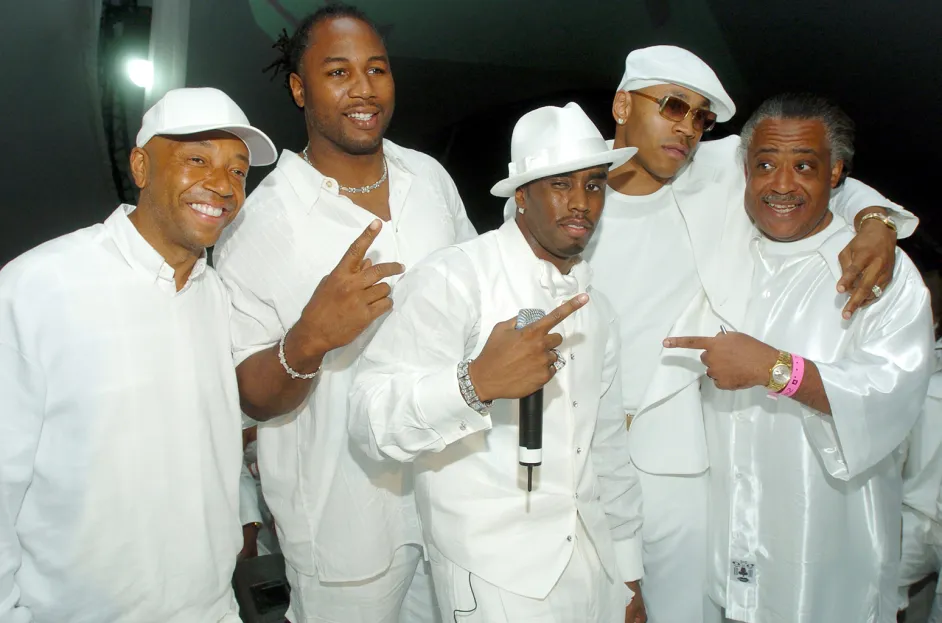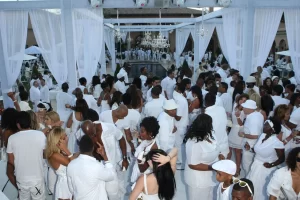Sean Combs’ lavish White Parties marked the peak of his cultural influence
3 min read
From left: Russell Simmons, Lennox Lewis, Diddy, LL Cool J and the Rev. Al Sharpton in the Hamptons.

From left: Russell Simmons, Lennox Lewis, Diddy, LL Cool J and the Rev. Al Sharpton in the Hamptons.
At one point, securing an invitation to Sean “Diddy” Combs’ extravagant White Parties was one of the most coveted tickets of the summer. Today, however, the allure of such gatherings has dimmed significantly, especially as Combs faces serious legal troubles that have tarnished his reputation.
Currently indicted in the Southern District of New York on charges including racketeering conspiracy and sex trafficking, Combs could be sentenced to life in prison if convicted. He has pleaded not guilty, but the severity of the allegations has forced many to reevaluate the opulent lifestyle he once embodied.
The indictment highlights disturbing claims about Combs’ private life, including accusations of orchestrating elaborate sexual encounters, referred to in the indictment as “Freak Offs.” These events allegedly involved drugging and coercing individuals to engage in prolonged sexual acts with male sex workers, reportedly beginning in 2009. Such revelations sharply contrast with the cultural phenomenon that was his White Parties, which spanned from 1998 to 2009.
Combs began hosting these annual soirees in 1998, aiming to carve out a space for himself within the exclusive Hamptons community of New York. He envisioned a melding of hip-hop culture with East Coast elite, famously stating, “strip away everyone’s image and put us all in the same color, and on the same level.” During a 2006 interview with Oprah Winfrey, Combs reminisced about the eclectic mix of guests, ranging from his Harlem friends to Hollywood stars like Leonardo DiCaprio, fresh off the success of “Titanic.”
However, the local elite was not as enthusiastic. “The people in the Hamptons thought the first party was the end of the world,” noted Steven Gaines, author of “Philistines at the Hedgerow.” Concerns about a noisy showbiz invasion marked the early receptions of Combs’ gatherings, yet they ultimately proved successful and established a new cultural norm.
Combs, much like F. Scott Fitzgerald’s Jay Gatsby, saw himself as a figure of opulence and allure, despite Gatsby’s tragic fate. In a 2001 interview, Combs boldly claimed, “I am the Great Gatsby!” This bravado reflected his ambition to redefine social boundaries, even if the consequences of such aspirations would later come into question.
From the outset, Combs’ White Parties drew an impressive roster of entertainment icons and industry leaders, with initial guest lists reaching up to 1,000 attendees. All guests were required to don all-white attire, creating a visually stunning spectacle. Martha Stewart, a guest at the first party, remarked on the striking sight of an entire crowd dressed in white, while Paris Hilton called the inaugural event “iconic.”

The celebrations quickly expanded beyond Labor Day to Fourth of July parties and various locations, including Los Angeles and Saint-Tropez. These gatherings served not only as lavish festivities but also as fundraisers for causes close to Combs, demonstrating his social influence and philanthropic efforts during that era.
As corporate sponsorship grew, the parties evolved into major cultural events, even becoming launch platforms for Combs’ ventures into colognes and vodka. The final official White Party took place in 2009 in Los Angeles, marking the end of an era that once epitomized a unique blend of celebrity culture and high society.
As Combs navigates these legal challenges, past media portrayals of his White Parties are being revisited for insights into his character. A clip from a 1999 interview with “Entertainment Tonight” recently resurfaced, showcasing Combs’ defiance in the face of potential backlash. “They don’t want me to throw the parties no more,” he stated, “But we ain’t going to stop. We gonna keep on having fun. Bringing people together from all walks of life.”
His prediction of ongoing controversy and resistance highlights a time when Combs was a cultural force, uniting diverse groups in a celebration of life and luxury. As we reflect on the legacy of the White Parties, it serves as a reminder of both the heights of cultural influence and the depths of personal downfall that can follow.